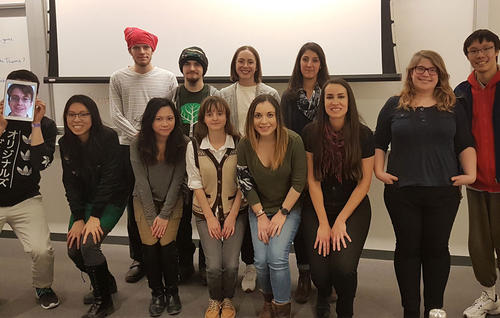
GI Jam event brings gaming to a whole new level
Participants turned gaming-development dreams into reality during a 48-hour event.

Participants turned gaming-development dreams into reality during a 48-hour event.
By Waterloo GI Jam organizing committee Games Institute
13 teams showed up ready to work at this term’s Waterloo Game Jam hosted by the Games Institute (GI) at the University of Waterloo. The GI Jam was a host site for the widely popular Global Game Jam (GGJ), the world’s largest hackathon focused on digital and physical game development. GGJ was held in 109 countries around the world this year. Annually, they have a new theme revealed to participants, which is a secret until all countries begin jamming at 5 p.m. local time. The theme for 2018 was “Transmission".
Each team had 48 hours to turn their gaming ideas from dream to reality. During that time, attendees built their games, creating everything from the art, characters, mechanics, narrative, music, and interfaces. Volunteers from the GI were present during the event to answer technical and aesthetic questions related to game-making.
“I am so happy to see both new and old jammers coming together to make very different games under this year's Global Game Jam theme,” said Cayley MacArthur, a former organizer of the GI Jam and a PhD student in Systems Design Engineering.
At the end of the event, attendees had the opportunity to submit their games to the GGJ, as well as showcase their creations to other participants. During an open arcade, participants play-tested each other’s games and voted for their favourites under four categories. Honours (and of course, jams) were awarded to the winners, which included:
Most Polished: Electrocat, a 2D puzzle game.
Most Fun: Hugh Jass’ Construction, a 2D arena battle game.
Most Innovative “Totally Went for it”: Cryptomons, an AR blockchain trading card game.
Best use of the theme “Transmission”: Radioparty, a 2D music-based survival game.
There were also some ‘Spirit Awards’ given by the GI Jam committee, based on awesome creations deserving some highlights, including:
Best Teamwork: Boats, Boats, Boats! A 3D tactical physics-driven game.
Best Narrative: Hematocrit Chrono, a top-down tactical shooter RPG.
Most social game: Human Intercepted, a co-operative party game.
“In this jam, the diversity and teamwork skills within the teams largely contributed to how games turned out in the end. This is reflective of many studios, where artists, engineers, and sales people must work together from different fields to make a game a success,” said Tina Chan, a volunteer for the GI Jam and a master’s student in the School of Public Health and Health Systems.
The GI Jam is built on three ideas: learn, make, and play, and typically runs during the last weekend of every January, May and September. Each event is open to the public and is designed to appeal to a wide variety of playful people.
The next game jam session is Friday, May 25 to Sunday, May 27. Until then, gamers are welcome to join the UW Game Development Club that meets every Thursday in East Campus 1 (at the corner of Columbia and Phillip) from 6 p.m. to 9 p.m. The night includes tutorials, discussions and play-testing sessions for all levels of gamers.
Stay up-to-day on upcoming events by visiting the GI webpage, Twitter or Facebook.

Read more
Here are the people and events behind some of this year’s most compelling Waterloo stories

Read more
Meet the 13 exceptional students representing Waterloo’s newest grads

Read more
More than doubling last year’s recipient pool, incoming students are recognized with $80,000 and $100,000 scholarships
The University of Waterloo acknowledges that much of our work takes place on the traditional territory of the Neutral, Anishinaabeg, and Haudenosaunee peoples. Our main campus is situated on the Haldimand Tract, the land granted to the Six Nations that includes six miles on each side of the Grand River. Our active work toward reconciliation takes place across our campuses through research, learning, teaching, and community building, and is co-ordinated within the Office of Indigenous Relations.